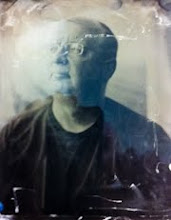Title: "He stumbled across the clavicle of the ancient beast"
(click to view large)
I've been reading an interesting book by Sir Ken Robinson called "The Element". I watched a TED presentation that Robinson made on how the educational system basically beats the creativity out of students, and he mentioned several anecdotes of people who had against all odds found their passion, there being a key moment in each story where an epiphany happened for the individual in question. The book I'm reading is the result of his gathering these stories and marrying them to his understanding of the environment that results in individual fulfillment through creativity. I just finished reading a chapter called "Finding the Tribe".
For a number of the individuals Robinson writes about, their epiphanies occurred when they met a group who shared the same passion that they did. It helped to know that they were not alone in their passion for a particular domain or field, and the tribe they found would prove to be important in their deepening development of their understanding, commitment and abilities. Robinson goes on to make a sharp distinction between finding a tribe, and being part of a "fan group". I was particularly struck by the fact that one consequence of being a fan is a process called "deindividuation", because it explained why I had become disenchanted with the photo sharing site flickr. On first inspection, one would think that flickr would be the ideal place to hang out and find your tribe if you are interested in photography. But the large volume of members makes that difficult, at least it did for me. I was fortunate to find a few people whose work I found inspiring and who were kind enough to take the time to look at my work and make thoughtful, insightful comments. But I was also overwhelmed by the huge volume of mediocre work I saw on flickr that garnered numerous trivial, overly complementary comments ("best photo I've ever seen") that really didn't merit those comments. Many people make hundreds of contacts amongst their flickr brethren, and then within these contact networks there arises a mediocre "esthetic by committee", which has tremendous support within the network. All of the people in these networks produce work that is virtually identical and interchangeable, the very antithesis of individuality. Amongst sports fans, this "deindividuation" is a consequence of the "mob mentality" that grows within such groups, as I learned from Robinson's book.
I wouldn't necessarily care what's happening with these other people on flickr, except that I found myself being influenced by the environment. I found that eventually I would choose work to post on flickr that I was pretty certain would garner some very positive response. When looking at recent work, I could always pick out one or two images that I knew would be well received when posted to flickr. So in the end, although I wasn't necessarily a member of one of these "mobs", I was allowing the flickr experience to limit my individual creativity, in the sense that I think art does not stop with the making, it continues with self curating of the work and decisions about where and how to present the work.
Another benefit of belonging to the right tribe is the synergy factor. Robinson makes a point of saying that you need not like everyone in the tribe, or everyone's work, but none the less the tribe environment allows for spontaneous group creative moments. In fact, the synergy results because each tribe member brings different (and often opposing) sensitivities and abilities to the table in the heat of the creative moment. Reading that made me realize that an online environment like flickr can never be an effective tribe from this point of view. Because there is no moment online. Someone sees something interesting in an image I have on flickr, and leaves a comment. One I'll see hours or days later, and if their comment creates a bit of a spark with me, I might leave a comment on one of their photos. But the sparks are just falling to the hearth, not igniting anything because the moment has long past (in reality never existed).
Naturally, the virtual environment does successfully work as a tribe for some. But I know it doesn't work that way for me, and now I understand why it doesn't. I realize that I need to spend my time making the images that matter to me and avoiding situations that influence what I make or what I decide to present to the world. If I'm searching for a tribe, it will be in the real world, not the virtual world.


No comments:
Post a Comment